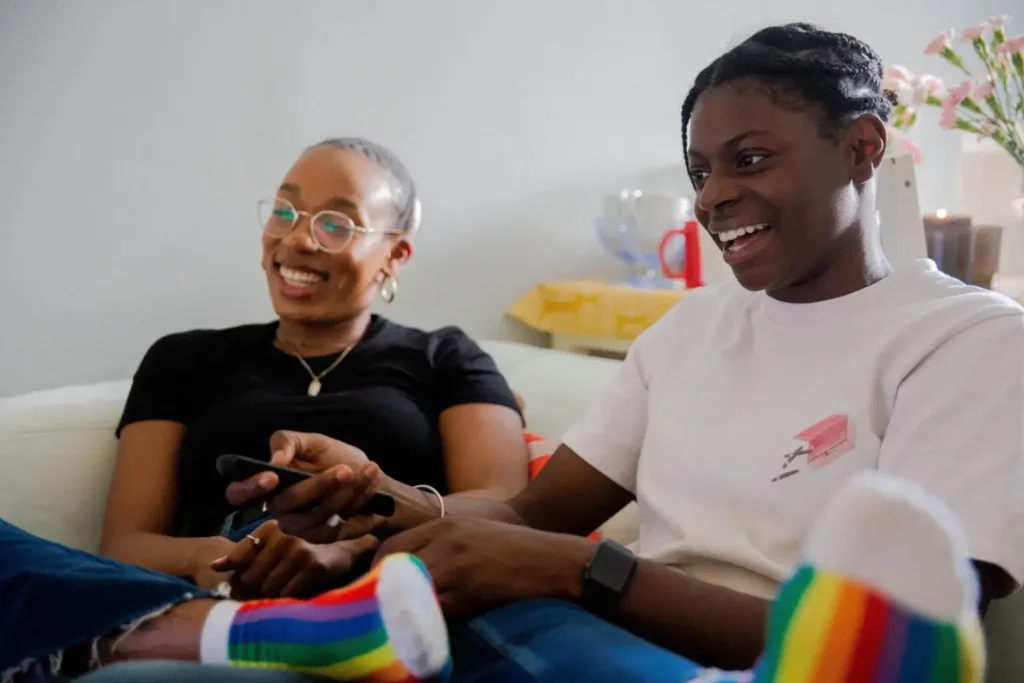
Mature relationships are based on trust, mutual respect, and communication. They involve compromise, consideration, and a willingness to put the other person first. Learning how to be more mature in a relationship is one part of that puzzle.
The research is clear: Emotionally maturity is linked to more healthy and satisfying relationships. At Therapie, we work with couples and help them create their ideal relationship every day.
In this blog post, I will unpack the term “emotional maturity” and what the heck it even means, as well as how to become more mature in a relationship.
Table of Contents

Emotional Maturity
You may wonder why I’m even talking about maturity. After all, we are adults, right? And, if not, it’s a matter of time until we are. What’s the big deal?
The thing is, even though we may be chronologically mature, many of us are not emotionally mature. We may have the body of an adult, but our emotions and behaviors are still childlike.
That is because emotional maturity is not solely about age. It’s about a level of awareness and responsibility that we develop over time.
Emotional Immaturity – An Example
Think about it this way: A two-year-old tantrums when they don’t get their way. They may cry, hit, or throw things. They may even hold their breath until they turn blue. Toddlers are not happy about grey areas and often need black and white answers.
Contrast that with a mature adult who is able to calmly communicate their needs and desires, even if they don’t get exactly what they want. They understand that life is full of grey areas and can live with ambiguity. They don’t need things to be black and white; they are comfortable with a more nuanced view of the world.
Let’s use an example of a couple that I met with as their couples therapist (Side note: The couple is a fictional couple – names and circumstances have been changed. But, I encounter a version of this in my work as a couples therapist every single week):
George and Sarah are fighting about the Holidays
George and Sarah had been married for two years when they came to see me. They were having the typical newlywed disagreements about money and in-laws. The thing that struck me most, however, was how George reacted when he didn’t get his way.
When Sarah said she wanted to spend the Holidays with her family instead of his, he pouted and became sullen. He would give her the silent treatment and refuse to talk to her for days at a time. It got to the point where Sarah was walking on eggshells, afraid to upset him. George’s behavior was emotionally immature. He was reacting to Sarah in a way that was more appropriate for a child than an adult.
Now, you may think that this example is a bit extreme, but it illustrates the point. Emotionally immature people tend to react to their surroundings in ways that are childlike and often counterproductive. They may have tantrums, act impulsively, or engage in self-destructive behaviors.
The truth is that many of us never learned how to deal with our emotions in a healthy way. We either stuff them down or we explode all over the people around us. Now, lets look at how mature partners would interact.

Emotional Maturity – An Example
Now that you have an idea of what emotional immaturity looks like, let’s explore the opposite side of the spectrum – emotional maturity.
George and Sarah Are Planning For the Holidays
Let’s go back to our fictional (but not-so-fictional) couple, George and Sarah. Remember, Sarah requested spending the Holidays with her family instead of his. Had George worked on his emotional maturity, he would have been able to have a conversation with Sarah about his feelings.
He may have said something like, “I’m really disappointed that we’re not going to be spending the Holidays together. I was really looking forward to it. Can we talk about why you want to spend them with your family and see if there’s a compromise that we can reach?”
George’s response would have been respectful and considerate of Sarah’s wishes. It would have also set a boundary – he made it clear that he has needs and desires that need to be met as well.
Emotional immaturity often leads to a hard stop in a conversation. Emotional maturity, however, allows for a give-and-take exchange in which both parties are able to express their needs and come to a compromise. It keeps the lines of communication open. Even if it means having to engage in difficult conversations, mature people are able to be emotionally vulnerable and stay engage with their significant others. Ultimately, that allows for a deeper level of understanding between partners.

Definition of Emotional Maturity – (aka: the key to being more mature in a relationship)
According to psychologist Daniel Goleman, emotional maturity is “the ability to control one’s emotions and respond to the world in a thoughtful and constructive way.” That means that emotionally mature people are able to regulate their emotions, set boundaries, and interact with others in a way that is respectful and considerate.
What does a mature relationship look like?
A mature relationship is comprised of two mature individuals that understand themselves, the other person, and how to take care of the relationship. Here are the top 10 signs to look for:
1. You are aware of your emotions and can label them accurately.
2. You understand that your emotions are not always rational or accurate.
3. You don’t allow your emotions to control your behavior.
4. You can delay gratification.
5. You are able to set and respect boundaries.
6. You are assertive (not passive or aggressive) in your communication.
7. You are able to handle conflict in a constructive way.
8. You are able to forgive others (and yourself).
9. You are comfortable with emotional intimacy.
10. You are able to take responsibility for your own happiness.
If you can say “yes” to most of these items, then congratulations! You are emotionally mature. If not, don’t worry. The good news is that emotional maturity is a skill that can be learned.
To summarize, emotional maturity is the ability to regulate emotions in a healthy way. This includes being able to understand and manage your own emotions, as well as the emotions of others.
Emotionally mature people are able to stay calm in difficult situations, and they don’t let their emotions dictate their behavior. They are also good at handling relationships, and they are able to communicate effectively.

10 Ways to Be More Emotionally Mature
1. Understand that relationships are give and take
In order to have a healthy relationship, both partners need to understand that it is a give-and-take situation. This means that each person needs to be willing to give and take into account the other person’s feelings, needs, and their partner’s perspective. If one partner is always taking without giving anything back, the relationship will eventually become unhealthy and unbalanced.
On the other hand, if both partners are constantly giving without taking anything for themselves, they will eventually become resentful. It is important to find a healthy balance between giving and taking in order to maintain a healthy relationship.
2. Communicate effectively with your partner
Communication is key in any relationship. And being a good communicator is a skill that can be learned. In order to communicate effectively, you need to be able to express your thoughts and feelings in a clear and concise way.
You also need to be a good listener. This means that you need to be able to understand what your partner is saying and feel empathy for their experience. It is also important to be patient when communicating with your partner. If you become impatient or frustrated, it will only make the situation worse.
3. Be understanding and accepting of your partner’s flaws
No one is perfect, and everyone has their flaws. This is especially true in relationships. If you can’t accept your partner for who they are, then the relationship will not last long. Emotionally mature people don’t need to overlook their partner’s flaws (after all, we all can sometimes have a bad day) and just focus on the good things that they bring to the relationship. But, they also don’t dwell on their partner’s flaws and try to change them. Instead, they accept them and move forward.
4. Don’t try to change who your partner is
In my work as a therapist, I often see people trying to work on each other rather than the relationship – unfortunately, that tends to make the relationship worse as it creates a sense of distance and resentment.
So, if you find yourself trying to change your partner, it’s important to take a step back and ask yourself why. Is it because you truly want them to be happy? Or is it because you want them to be more like you? If it’s the latter, then it’s time to let go and accept that they are their own person.
5. Show interest in what your partner is interested in
As a relationship expert, I understand that shared hobbies are not necessary to have a happy and healthy relationship. In fact, many relationships actually benefit from having different interests. However, I do believe that it’s important to show an interest in what your partner is interested in.
This helps to create a deeper connection and understanding between both partners. One way to do this is to ask questions and learn more about their interests. You may not want to go golfing or to a cycle class with your spouse every week, but if it’s important to them, showing an interest in their hobby will go a long way.
6. Don’t be afraid to be yourself around your partner
One of the most important things in a relationship is feeling comfortable and being yourself around your partner. Emotionally mature people know this and they aren’t afraid to be themselves around their partner. This helps to create a sense of trust and intimacy between both partners.
When people first start dating, they often put on a “mask” and try to be someone that they think their partner will want. But, eventually, this “mask” will start to crack and the true self will come out. It’s important to be genuine from the beginning so that your partner knows who they are really dating.
7. Be supportive of your partner’s dreams and goals
Another important thing in a relationship is being supportive of your partner’s dreams and goals. Emotionally mature people know this and they are willing to do whatever it takes to help their partner achieve their dreams.
This includes offering emotional support, providing practical assistance, and cheering them on every step of the way. It’s also important to practice patience and understanding if your partner’s dreams take longer to achieve than you had originally planned.
8. Be willing to compromise in order to make the relationship work
No relationship is ever perfect, and there will always be times when both partners need to compromise. Emotionally mature people are willing to do this because they know it’s necessary for the relationship to work.
They understand that relationships are about give and take. So, if you find yourself in a situation where you need to compromise, don’t be afraid to do it. It’s a sign of strength, not weakness.
9. Deal with conflict in a constructive way
A person’s ability to deal with conflict in a calm and helpful way is a significant factor of a mature relationship. When both partners are able to communicate openly and honestly about their feelings, it can help to resolve conflict in a constructive way.
This doesn’t mean that there won’t be arguments or disagreements, but it does mean that both partners will be able to work through them in a healthy way. When you screw up (hey, you are an imperfectly perfect human being – like everyone else!), own up to it. Admit mistakes and apologize.
On that note, if your person is taking responsibility for their screw ups, thank them and accept your partner’s choice to do their part to improve the relationship. Holding grudges and clinging to the past creates an unhealthy environment and will only lead to more conflict.
10. Seek professional help if needed
If you’re struggling in your relationship (or life), it may be time to seek professional help. Relationship problems can be difficult to deal with on your own, and sometimes it’s helpful to have an outsider’s perspective to help you and your partner get on the same page again.
A licensed therapist or relationship coach can provide you and your partner with the tools and guidance you need to talk through your difficult feelings, work on resolving conflicts, and improve your relationship so that the future is something to look forward to again.

Mature Relationship = Healthy Relationship
A mature relationship is a healthy one. And, it is also the most fulfilling and satisfying and will strengthen the commitment between you and your partner.
To feel good in a relationship, partners need to spend time together (and dare I say, it should be “quality time,” which means not just sitting on the couch in front of the TV!), but also time apart to pursue their own interests and hobbies – emotional independence is just as important!
Both partners should feel free to express their feelings, needs, and wants without fear of judgment or rejection. There should be mutual respect for each other’s opinions, even if you don’t always agree.
Having a positive attitude (the belief that compromise is possible), can lead to finding common ground and more understanding. Talking with respect is just as important as maintaining boundaries in a relationship.
Mature love leads to less doubt and hurt for either person. It can strengthen the commitment and help each partner genuinely love the other person.

Your Turn to Be More Mature in a Relationship
I hope this article has given you some insights into what it means to have a mature relationship and how to be more mature in one.
My invitation is to take this blog post, share it with your partner, and have an honest conversation about what you each think it means to have a more mature relationship, how good you are at the moment, and what either of you can do to work on it.
If fights tend to get out of control, don’t forget to check out our free mini-course on how to stop every fight in its track. If you are interested in working with us, jump on our schedule for a free consultation call.


